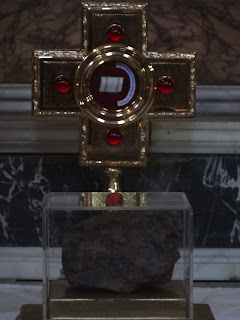I just got back from a long two-day trip to Tegucigalpa with
three leaders from the parish of Dulce Nombre de María. One has been the parish
council treasurer for years; another has been the parish council secretary and
is one of the parish’s 16 communion ministers; he other worked on the parish’
three year agricultural project and is on his town’s church council. They are
real representatives of the parish
St. Thomas Aquinas Church in Ames, Iowa, a sister parish
with Dulce Nombre, had invited the parish here to send some parishioners for a
visit in order to deepen the relationship between the two parishes. St. Thomas
promised to pay all the costs involved and has already paid for three passports
and for the $160 per-person non-refundable interview fees.
They also each had a letter from Padre German, Dulce
Nombre’s pastoral administrator, attesting that they were going as the parish’s
representatives. I also gave them a letter explaining to the embassy that I was
accompanying them to and from Ames, Iowa. The Republican Senator from Iowa also
sent a note by e-mail to the US Department of State in Honduras at the request
of St. Thomas Aquinas Church.
But these three leaders were denied, despite the fact that
the letter from Fr. Jon Seda, the pastor of St. Thomas stated that the parish
“is assuming all the costs” for their visits. The first parishioner was refused
after the interviewer read the letter and looked at the information from his
bank. He was asked who would pay and replied, “St. Thomas.” The interviewer
told him that he was refused because he didn’t have enough money in his bank
account.
Yeah. He’s poor!
They were all three given a letter in English and Spanish to
“explain” why. Interestingly, the Spanish version is slightly different from
the English. The letter explains that they cannot appeal the decision but they
can reapply at any time, of course submitting a new form, paying the
application fee again, and making a new appointment.
Then in English it reads: “If you choose to reapply, you
should be prepared to provide information that was not presented in your
original application, or to demonstrate that your circumstances have changed
since that application.”
The Spanish reads: “Durante la entrevista, Usted deberá
proporcionar la información que no fue presentada en la solicitud original
demonstrando que sus condiciones socio-económicos han cambiado”.
The Spanish says that the changed circumstances are related
to their “socio-economic conditions."
I know that this happens everyday and has happened twice
here to two other persons who were to be sponsored by Catholic institutions in
the US.
I know that this is only the tip of the iceberg that is the
unjust immigration system in the US.
But it strikes home. I know this people who are sincere followers of Christ.
There are poor people but a parish in the US, which is in
solidarity with the parish here, promised to pay all the expenses – and has
already put out more than $800 for this.
I don’t think that is the fault of the interviewer.
According to the two men they were treated respectfully.
But what the US government looks for in these interviews is the almighty dollar.
Solidarity does not mean much.
Money matters, not solidarity.
I think this reveals some of the problem with US migration
policy. It’s based on fear, fear of the other, of the different. There is also
the fear to “our way of life.”
Security matters – but security in terms of money and what
money can buy.
But real security here must be measured in terms of
solidarity, which I experience over and over.
I experienced it the day before yesterday. My car broke down
again on a hill outside San Miguelito, Intibucá. A guy who was a mechanic stopped by and looked at
the problem. He told us that he would get his tools and come back and see if he
could fix it enough for us to get to Esperanza. He came back in fifteen
minutes, bled the brakes, and sent us on our way. While he worked on the car he told me that his name was Santiago, but everyone calls him Tito. I offered him money, but Tito
refused it.
For him, solidarity is more important than money.
And so I am ashamed - again - of what the US government does.
And I am angry that three good leaders of our parish here will not be able to share with the parishioners of St. Thomas Aquinas parish.
But I am grateful to be here and for the people's solidarity.



































